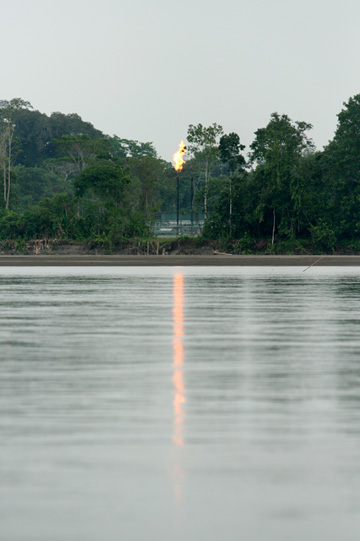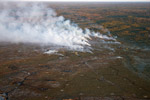Coal truck in western China. Photo by: Rhett A. Butler.
Governments, NGOs, and others fighting climate change should consider buying coal and oil deposits—not to exploit them, but to keep them from being exploited, according to a bold new policy paper in the Journal of Political Economy. Economist Bard Harstad with the Kellogg School of Management argues that climate coalitions could quickly slash carbon emissions by purchasing and conserving marginal fossil fuel deposits, a strategy that would solve the current problem of carbon leakage, i.e. when cutting emissions in one place pushes others to burn more elsewhere. Given that carbon emissions rose to a new record last year—31.6 gigatons—and carbon has hit 400 parts per million (ppm) in the atmosphere for the first time in at least 800,000 years, Harstad’s analysis comes at a time when scientists are warning that urgent and bold action is needed to mitigate global climate change before it becomes irreversible.
Harstad says buying fossil fuel deposits would work to cut emissions in two ways. First taking some fossil fuel deposits off the market would reduce extraction and, subsequently, emissions. But the second way “makes my results more powerful,” Harstad told mongabay.com
“By purchasing ‘marginal’ fossil fuel deposits (which would be costly to exploit), the supply in foreign countries become less ‘elastic’ (sensitive to the [global] price), which reduces what I have called ‘supply-side leakage’ in the paper. This makes the coalition’s own supply-side policy more effective, i.e. the coalition can reduce its own extraction without fearing that the non-participants will increase theirs by a similar amount,” he explains. Such a policy, according to Harstad, would create an financial market whereby participating nations could successfully reduce their own emissions without fearing that meeting their target would result in carbon leakage elsewhere.
Many might think it improbable, if not impossible, that nations would buy up fossil fuel deposits only to keep them under the ground. But Harstad compares his policy to the UN’s Reduced Emissions from Deforestation and Degradation (REDD) program, which proposes to pay nations to keep forests standing for their carbon storage instead of cutting them down.
 Gas flare at an oil refinery across the river from Yasuni National Park. Photo by Jeremy Hance. |
“This policy instrument is in line with REDD, successfully (at least to some extent) protecting tropical forests from deforestation,” Harstad explains
Still, REDD remains in a testing phase and has yet to be rolled out globally.
Harstad also argues that the price of such fossil fuel deposits shouldn’t detract potential buyers, whether nations or NGOs.
“No matter the negotiated price, the coalition benefits paying this price. Intuitively, the equilibrium price will not be very large, since the coalition will mainly by ‘marginal deposits’ which has a low price, due to their low profit, in turn due to their high extraction costs. Of course, if the coalition cares a lot about the climate, it will buy more, and it will be more costly (and more beneficial),” he says, adding that “it is a more efficient climate policy than the alternative of simply reducing consumption.”
Harstad says this policy would likely raise fossil fuel prices “somewhat” globally, which would be “good for the buyer if they are exporting, but bad if they are net importers [of fossil fuels].”
A rise in fossil fuel prices would likely spur more investment in renewable energy and efficiency, as well.
Harstad also suggests that if buyers fear that marginal deposits will suddenly be nationalized and subsequently exploited—making their investment worthless—they could consider renting rather than buying the deposits. This idea could also lead to lower costs for the coalition.
While Harstad encourages NGOs to consider his policy, he thinks it would be most effective at the national and international level, since theoretically they would be able to purchase enough deposits to really make a dent in emissions.
“The analysis shows that progress on international climate policy is best achieved by simply utilizing the existing market for extraction rights,” he said in a recent press release.
Harstad’s policy is not without some precedent. Ecuador has proposed not to exploit a vast oil deposit under a section of primary rainforest in Yasuni National Park, if a coalition of nations and NGOs pays $3.6 billion into a United Nations Development Fund (UNDF), which is about half of what the oil is currently worth. To date the Yasuni-ITT Initiative, as it is known, has raised $116 million.
“This is an example of what I suggest, and my analysis show that this is not only an effective way of preserving forests, but also of mitigating climate change,” Harstad explains.
However, the Yasuni-IIT Initiative has been fraught with problems, including some experts calling it “blackmail” and so far the initiative has raised far less than Ecuador initially hoped. In fact, the Initiative may do well to take note of Harstad’s ideas and consider renting the deposit for an annual payment rather seeking one lump sum. Still, even with Yasuni-ITT’s issues many see it as one of the most promising and innovative programs in the world to combat climate change, including Harstad.
“My analysis and its results have strengthened my belief in such projects as the best (and perhaps ideal) way of mitigating climate change emissions,” he says.
As the impacts of climate change worsen—droughts, floods, heatwaves, melting glaciers, sea level rise—it may be only a matter of time before ideas like Harstad’s, which today may appear quite radical, become inevitable.
CITATION: Bard Harstad. Buy Coal! A Case for Supply-Side Environmental Policy. Journal of Political Economy. 2012.
Related articles
Another record in global carbon emissions puts globe on track for ‘devastating consequences’

(05/29/2012) Last year global carbon dioxide emissions rose 3.2 percent to a new record of 31.6 gigatons, keeping the planet on track to suffer dangerous climate change, which could propel global crop failures, sea level rise, worsening extreme weather, and mass extinction. According to data from the International Energy Agency (IEA), China’s carbon emissions rose the most last year (9.3 percent) while emissions in Europe and the U.S. dipped slightly. China is the currently the world’s largest emitter of greenhouse gases, while the U.S. has emitted the most historically.
Featured video: why one scientist is getting arrested over climate change
(05/16/2012) In March 2012 the head of NASA’s Goddard Institute for Space Studies and well-known climatologist, James Hansen, spoke at a TED conference to explain what would push a 70-year-old scientist to participate in civil disobedience against mountaintop coal mining and the Keystone Pipeline, even leading to several arrests.
Consumption, population, and declining Earth: wake-up call for Rio+20

(05/15/2012) Currently, human society is consuming natural resources as if there were one-and-a-half Earths, and not just a single blue planet, according to the most recent Living Planet Report released today. If governments and societies continue with ‘business-as-usual’ practices, we could be consuming three years of natural resources in 12 months by 2050. Already, this ecological debt is decimating wildlife populations worldwide, disproportionately hurting the world’s poor and most vulnerable, threatening imperative resources like food and water, heating up the atmosphere, and risking global well-being.
13 arrested for blockading coal train, including Nobel Prize winning economist
(05/07/2012) Thirteen Canadians were peacefully arrested this weekend for blockading Burlington Northern Santa Fe (BNSF) Railway train tracks in order to prevent the passage of coal stemming from the United States and destined to be burned in Asia. Among those arrested was Mark Jaccard, an economics professor with Simon Fraser University, who won the Nobel Prize for his work with the Intergovernmental Panel on Climate Change (IPCC).
For Earth Day, 17 celebrated scientists on how to make a better world

(04/22/2012) Seventeen top scientists and four acclaimed conservation organizations have called for radical action to create a better world for this and future generations. Compiled by 21 past winners of the prestigious Blue Planet Prize, a new paper recommends solutions for some of the world’s most pressing problems including climate change, poverty, and mass extinction. The paper, entitled Environment and Development Challenges: The Imperative to Act, was recently presented at the UN Environment Program governing council meeting in Nairobi, Kenya.
Massive coal mine in Australia beats back climate change legal challenge
(04/03/2012) An Australian court last week ruled that climate change was not reason enough to halt the $6.3 billion Wandoan coal mine in Australia in a landmark case. Swiss coal mining company Xstrata succeeded in defeating a challenge from the environmental NGO Friends of the Earth and local farmers, which argued that the mine should be halted due to its resulting carbon emissions.
Obama Administration, Shell moving ahead with Arctic oil exploitation

(04/02/2012) Last week, the U.S. Department of the Interior approved oil spill clean-up plans by Royal Dutch Shell Oil in the Beaufort Sea, paving the way for offshore oil drilling in the Arctic to begin as soon this year. The Interior’s approval was blasted by environmentalists, who contend that oil companies have no viable way of dealing with a spill in the icy, hazardous conditions of the Arctic, far from large-scale infrastructure. Shell, which has spent $4 billion to date to gain access to the Arctic, must still be granted final permits for drilling.
Oil exploration approved in Africa’s oldest park, Virunga National Park
(03/19/2012) Permits for controversial oil exploration in Virunga National Park have been released after request by NGO Global Witness. Oil company, SOCO International, has confirmed it has received two permits to undertake preliminary exploration, including seismic tests, in the UNESCO World Heritage Site. Located in the Democratic Republic of Congo (DRC), Virunga is famous for its population of the Critically Endangered mountain gorillas (Gorilla beringei beringei).
Tar sands emit more carbon than previously estimated

(03/12/2012) Environmentalists have targeted the oil-producing tar sands in Canada in part because its crude comes with heftier carbon emissions than conventional sources. Now, a new study in the Proceedings of the National Academy of Sciences (PNAS) has found an additional source of carbon that has been unaccounted for: peatlands. Mining the oil in the tar sands, dubbed “oil sands” by the industry, will require the wholesale destruction of nearly 30,000 hectares of peatlands, emitting between 11.4 and 47.3 million metric tons of additional carbon.